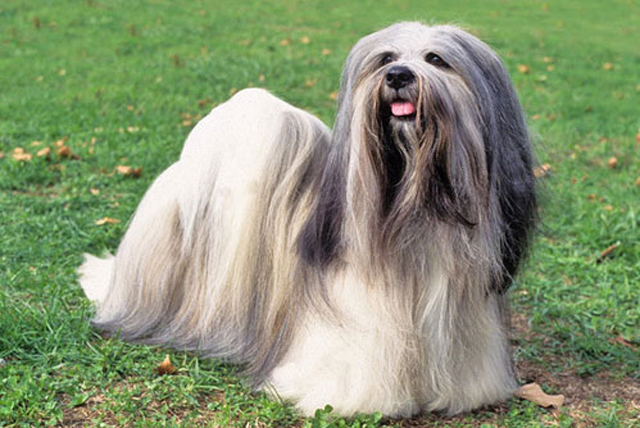Lhasa Apsos, a breed with a rich history and a unique set of characteristics, have charmed their way into the hearts of dog lovers worldwide. Originally from Tibet, these small yet sturdy dogs were bred to serve as watchdogs in monasteries, alerting monks to potential intruders. Despite their diminutive size, Lhasa Apsos possess a regal bearing and a self-assured demeanor. Their long, flowing coats and expressive eyes add to their appeal, but owning a Lhasa Apso comes with its own set of surprises. Some of their behaviors might seem unusual to the uninitiated, but these quirks are perfectly normal for this fascinating breed. Let’s delve into seven crazy things perfectly normal for Lhasa Apsos.

7. Aloofness with Strangers
Lhasa Apsos have a natural aloofness towards strangers, a trait that can be traced back to their origins as sentinel dogs in Tibetan monasteries. This wariness was essential for their role in alerting monks to potential threats. As a result, Lhasa Apsos tend to be reserved and cautious around unfamiliar people. They are not the type of dogs to rush up to strangers for attention; instead, they prefer to observe from a distance before deciding whether to engage. Socialization from a young age is crucial to help them develop a balanced approach to meeting new people. With proper exposure and positive experiences, Lhasa Apsos can learn to accept strangers more readily, though they will always retain a bit of that natural reserve.
6. Quirky, Cat-Like Behaviors
One of the most endearing and quirky aspects of Lhasa Apsos is their tendency to exhibit behaviors commonly associated with cats. These dogs often groom themselves meticulously, using their paws to clean their faces and bodies. They also have a penchant for high vantage points, seeking out elevated spots like the back of a couch or a window sill to observe their surroundings. This feline-like independence and self-sufficiency can amuse and baffle owners accustomed to more traditionally dog-like behavior. Embracing these cat-like quirks is part of the charm of living with a Lhasa Apso, underscoring their unique personality.
5. Luxurious, High-Maintenance Coat
The Lhasa Apso’s long, flowing coat is one of its most distinctive features, but it also requires significant care. Their hair can grow long and is prone to tangling and matting if not regularly groomed. Owners must commit to frequent brushing, regular baths, and occasional professional grooming to keep their Lhasa Apso looking their best. Some owners keep their dog’s coat trimmed short for easier maintenance, while others prefer the traditional long coat, which requires more effort but showcases the breed’s elegance. Understanding and committing to the grooming needs of a Lhasa Apso is essential for maintaining their health and appearance.
4. Strong Guarding Instincts
Despite their small size, Lhasa Apsos possess a strong guarding instinct. This trait is a remnant of their history as monastery watchdogs, where they were relied upon to alert monks to any intruders. Lhasa Apsos are known for their keen sense of hearing and vocal nature, often barking at the slightest unfamiliar sound or movement. This makes them excellent watchdogs but can also lead to excessive barking if not properly managed. Training and socialization are key to ensuring their guarding instincts are not problematic. Teaching them to bark on command and to quiet down when asked can help manage their vocal tendencies.
3. Playful Yet Reserved Nature
Lhasa Apsos exhibits a unique blend of playfulness and reservation. They enjoy playtime and can be lively, engaging in games and enjoying the company of their human family. However, they also have a reserved side, often observing situations before deciding to join in. This duality can be seen in their interactions with other dogs and new environments, where they may initially be cautious before engaging in play. This trait reflects their intelligent and discerning nature. Providing a balance of interactive play and allowing them space to observe and decide when to participate can help them feel secure and happy.
2. Long Lifespan and Health Considerations
Lhasa Apsos are known for longevity, often living well into their teens. They can enjoy a long and active life with proper care and a healthy lifestyle. However, this long lifespan also means owners must be aware of potential age-related health issues. Common concerns include eye problems, hip dysplasia, and skin conditions. Regular veterinary check-ups, a balanced diet, and appropriate exercise are essential to maintaining health. Being proactive about their medical care and understanding the specific health needs of the breed can ensure that a Lhasa Apso enjoys a high quality of life throughout their many years.
1. Velcro Dog Syndrome
Lhasa Apsos are often called “Velcro dogs” because of their strong attachment to their owners. They thrive on human interaction and often follow their people from room to room, seeking constant companionship. This affectionate trait can be endearing but might also pose challenges for owners who need some alone time. Training Lhasa Apsos to be comfortable with occasional separation is important to prevent anxiety. Providing them with interactive toys or comfort items can help ease their stress when left alone.

Lhasa Apsos are a delightful blend of intelligence, affection, and energy, making them wonderful companions for the right owners. Understanding and embracing their unique traits, from their love for water to quirky sleeping positions, can enhance the bond between owner and pet. Though sometimes surprising, these seven behaviors are perfectly normal for Lhasa Apsos and contribute to their distinctive charm. By appreciating these qualities, owners can provide the best care and create a fulfilling and joyful relationship with their furry friend.
 Toledo, United States.
Toledo, United States.